Weather:
- Ha Noi 26oC
- Da Nang 31oC
- Ho Chi Minh 33oC
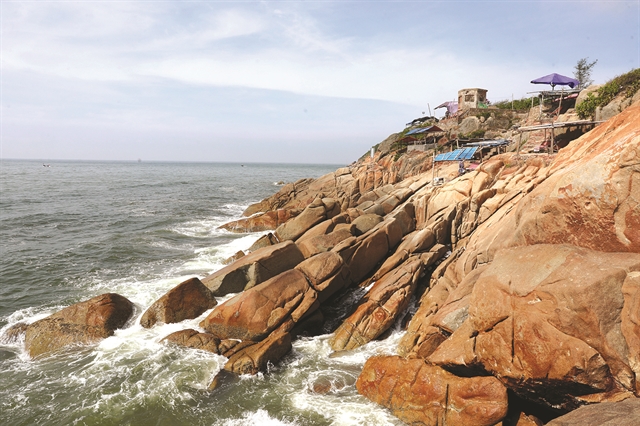
by Nguyễn Mỹ Hà
It’s a sunny mid-summer’s day at what is probably Việt Nam’s largest public beach, Sầm Sơn in Thanh Hóa Province, a drive of three hours or so south from Hà Nội along National Highway 1.
A group of teenagers climb the large rocks around Độc Cước Temple at one end of the 9-km-long beach. They came down from mountainous Thái Nguyên Province a few days ago to mark the end of the school year, with a team-building day and a night of fun.
“I love the beaches here in Thanh Hóa,” says Cao Xuân Dương, 17, an 11th grader majoring in physics at the Thái Nguyên High School for the Gifted. Thái Nguyên is a hilly, land-locked province famed for its tea but, needless to say, is minus a beach.
The group of youngsters were among the thousands who headed to Sầm Sơn for a summer holiday.
The beaches in Thanh Hóa are the most popular coastal destinations in Việt Nam’s north, with Sầm Sơn welcoming close to 5 million visitors in 2019 -- more than half of the 9.5 million people who visited the province.
COVID-19 had a serious effect on the number of beach-goers, especially on the April 30 - May 1 long weekend. Holiday-makers were down by half in Sầm Sơn compared to last year, according to provincial tourism authorities.
Sầm Sơn in the summertime
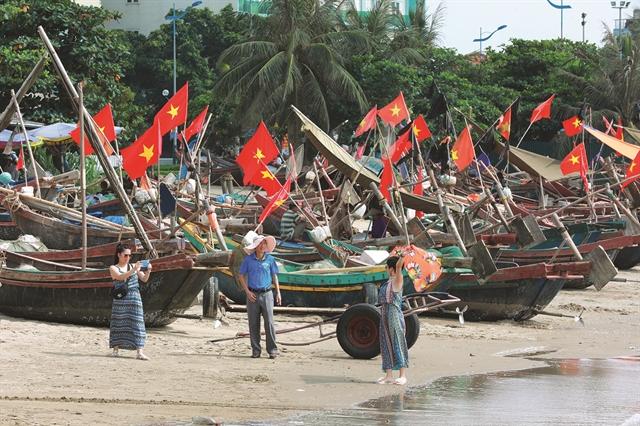
The same tourism authorities have projected that the peak for local tourists visiting Sầm Sơn this year will be in the second half of this month. All restaurants, hotels, and homestays in the area have begun to work at full pace to ready themselves to welcome a growing number of visitors.
Nearly three months have now passed without any cases of community transmission of COVID-19 in Việt Nam, but the tourism sector has suffered terribly and the Government has encouraged people to take a staycation, and Sầm Sơn has been the most popular so far. “Vietnamese people travel in Việt Nam” has become the new tourism slogan of the year.
A series of tourism promotions were held over the course of June, leading up to the peak in July. The Sầm Sơn Summer 2020 Street Carnival kicked off a fortnight ago, with dancers from the Sun Group Dance Troupe attracting thousands.
A traditional festival for square and round sticky rice buns got underway in the early days of July - the largest traditional festival in the beach city and with all of its wards and craft guilds honouring the Saint of Độc Cước Temple. Wooden ovens cook traditional square cakes during summer days of 40 degrees Celsius, which makes the festival a sweltering affair.
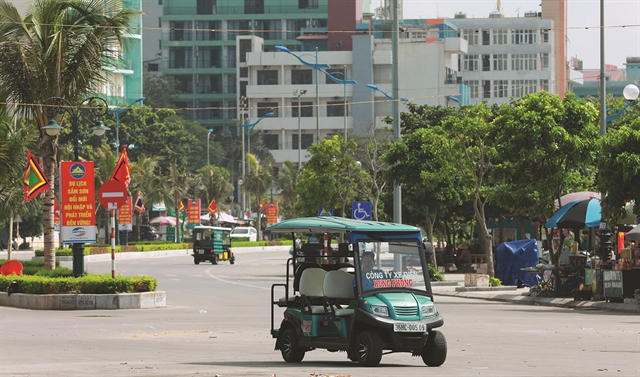
A ceremony to pray for good weather was also held at the city’s fish harbour, where people sought good catches out at sea for fishing families.
It was a peaceful day by the water, with beach-goers lapping up the sea breeze and gently-breaking waves. Nearby were more than 200 fishing boats belonging to the local fishing guild.
“On a day like this, we remain onshore,” says Văn Đình Hiền, a 37-year-old fisherman who heads out to sea alone when the weather is kind. Next to his boat, an elderly couple were cleaning their nets. The husband ventured out to sea at midnight and returned at dawn, his bamboo traps netting a few dozen small crabs.
The tradition in the fishing village is for men to set out to sea alone. Their wives remain home doing the housework and taking care of parents and children, then helping with net repairs after each trip.
Crowds mean joy
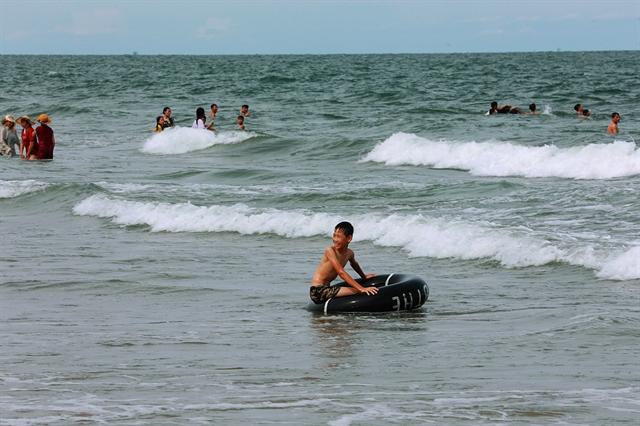
Four women in their late 50s and early 60s just came up from the shore when a message on the loudspeaker announced, “The time for bathing is finished, everyone come up from the shore!”
They are from a town 40km away. “We come here several times every summer,” says Trịnh Thị Mơ. “It’s not as crowded as last year, and I prefer crowds because it’s much more fun!”
If more people means more fun, then only joy accompanied Phan Sơn Tùng, 34, as his extended family of 32 rented a bus and travelled down from Thái Nguyên to Sầm Sơn for a long-awaited family getaway.
“Some members of our family would normally go on team-building trips with their company during the summer, but this year we felt we wanted a family trip,” said Tùng.
Big groups, either company staff or families, are a feature of Sầm Sơn, which has been a favoured summer destination for more than a century.
'Discovered' in 1906 and selected by the French as a spot for getaways, Sầm Sơn then became a coastal holiday centre of Indochina. Việt Nam’s last emperor, Bảo Đại, also had a villa near the water.
After Việt Nam became a republic in 1945, government offices and factories with large numbers of workers built accommodation by the beach for their staff on summer holidays.
Trade union guest houses were also popular, where workers travelled in large groups to spend a few days by the sea.
Sầm Sơn was so popular during the 1980s that almost everyone in Hà Nội with the means to do so went there for a summer break. At school, kids would boast about trips to the seashore with their parents’ companies.
The sand at Sầm Sơn is fine, the salt in the water mild, and the sea a light blue. Its small waves are enough for kids to frolic in but not too strong to pull anyone under.
For millions of Vietnamese in the north, it was the ultimate summer destination.
Then came Việt Nam’s open-door policy and Sầm Sơn was swept up in the move towards a market economy. Businesspeople became more market-oriented, seeking more customers for their hotel or restaurant. Professional photos taken by the beach, renting a car tyre's inner tube for fun on the water, or posing on horseback - all at a price - became popular.
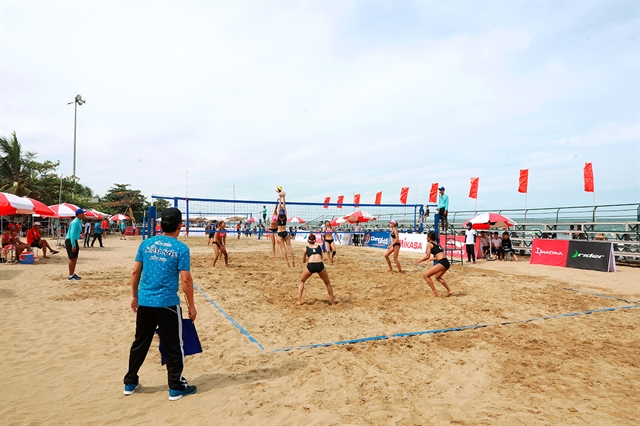
The competition became unbearable at times, however, with exorbitant prices and scams becoming so common that local authorities had to introduce harsh sanctions. The strong temperaments of the local sea-faring people would often clash with sharp-tongued tourists, leading to disagreements that could spoil a holiday.
Over the last five years the local government has worked hard to introduce a plan for the beach city, with a broad seaside boulevard now separating sand from accommodation. Sầm Sơn also boasts a five-star FLC beach resort, while electric buggies ferry beach-goers to and from hotels and the water.
Changing times
Up by the large rocks where Độc Cước Temple overlooks the sea, people seeking privacy or simply peace and quiet can climb up a few steps and find beach lounge chairs with expansive views out to sea.
A dozen lounge chairs are scattered between the rocks, tended to by 62-year-old Văn Thị Phương. “I’m actually not allowed to be here,” she says. “But I’ve had a stall up here selling water since 1988.”
Back in 1988, she said, tourists weren’t as numerous as they are now. Then, in the early 90s, more people began coming to Sầm Sơn during the summer and her husband found a job as a lifeguard. He watched over the beach for 20 years until he died.
Though she has four adult children, Phương still needs to work to make ends meet.
“So many people have died from COVID-19 around the world,” she says. “We are so grateful that Việt Nam has escaped the worst of it. I can’t complain about my sales being down, because many others have had a much tougher time.”
Like her husband the lifeguard, she often tells people not to swim in the water when it’s dangerous. Sometimes, during major holidays, film or TV crews arrive and she sells them water.
“I also keep the place clean, and if the Government wanted to do it then they would have to pay someone, but I keep being told I can’t be here anymore,” she went on. “People in authority change every five years, and I keep begging them to allow my stall to stay open. When security arrives, though, I take down my umbrellas.”
Her dark, suntanned skin shows she’s more than capable of taking care of herself, but having to move and earn a living down by the beach would certainly put her out of her comfort zone.
It would also be difficult for people in power to find her a new job, if they were so inclined, as she doesn’t fit into any employment categories. But she still wants to work, selling water to sweaty temple-goers in her favourite spot on one of the most beautiful beaches in the country.
Sipping water after a climb, 11th grader Dương says, “Next year I’m going to take my college exams for Hà Nội’s Foreign Trade University. This is my second trip to Sầm Sơn, and it has inspired me to become a trader and travel to new international shores.”
For some reason, Sầm Sơn has been left off lists of popular tourist destinations on TripAdvisor.
As many as 200,000 international visitors visited Thanh Hóa last year and many stayed at resorts by the beach. Sầm Sơn remains largely a place for Vietnamese travellers, however, and it will be their staycation this summer who help it move into the future. — VNS



